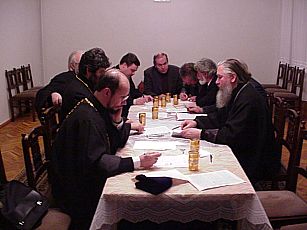Conversations between representatives of the Russian Orthodox Church and the Armenian Apostolic Church
15.02.2001 · English, Архив 2001
CONVERSATIONS BETWEEN REPRESENTATIVES OF THE RUSSIAN ORTHODOX CHURCH AND THE ARMENIAN APOSTOLIC CHURCH
 First bilateral conversations between delegations of the Russian Orthodox and the Armenian Apostolic Churches have been opened at the Holy Etchmiadzin, Armenia, on 13 February 2001 in the result of the agreement between His Holiness Patriarch Alexy II of Moscow and All Russia and His Holiness Karekin II, Supreme Patriarch and Catholicos of All Armenians. The dialogue was approved by the Bishops’ Council and the Holy Synod of the Russian Church.
First bilateral conversations between delegations of the Russian Orthodox and the Armenian Apostolic Churches have been opened at the Holy Etchmiadzin, Armenia, on 13 February 2001 in the result of the agreement between His Holiness Patriarch Alexy II of Moscow and All Russia and His Holiness Karekin II, Supreme Patriarch and Catholicos of All Armenians. The dialogue was approved by the Bishops’ Council and the Holy Synod of the Russian Church.
His Holiness Patriarch Alexy II of Moscow and All Russia sent a message of greeting to the participants in the conversations (see below). On February 13, the participants were received in audience by His Holiness Patriarch and Catholicos Karekin II. The Russian Orthodox Church delegation is led by Archbishop Clement of Kaluga and Borovsk, first deputy chairman of the Department for External Church Relations of the Moscow Patriarchate, and the Armenian Apostolic Church delegation is led by Bishop Eznik Petrosian, Chairman of the Department for External Church Relations of the Armenian Apostolic Church.
 The participants in the conversations, which will continue till February 15, will consider the relations of the Church with the nation, state, secular society and the world of politics, as well as the problems of economy, environment, bioethics, education and international relations. The discussions will be based on the Bases of the Social Concept of the Russian Orthodox Church.
The participants in the conversations, which will continue till February 15, will consider the relations of the Church with the nation, state, secular society and the world of politics, as well as the problems of economy, environment, bioethics, education and international relations. The discussions will be based on the Bases of the Social Concept of the Russian Orthodox Church.
To the participants in the conversations
between the Armenian Apostolic and Russian Orthodox Churches
on the church and social themes
Respected participants in the conversations!
I wholeheartedly greet you with the fraternal kiss in Christ Jesus by the words of St.John the Theologian: ‘Grace be with you, mercy and peace, from God the Father, and from the Lord Jesus Christ, the Son of the Father, in truth and love’ (2 Jn.3).
Your meeting is of a historic importance, as it begins the direct bilateral dialogue between our fraternal Churches agreed upon by us and His Holiness Karekin II, Supreme Patriarch and Catholic of All Armenians during his first official visit to Moscow in February-March 2000. At the same time the present conversations continue the tradition of close friendly relations and contacts, which have existed between our Churches during centuries and which have been visibly strengthened since the beginning of the primatial ministry of His Holiness Karekin II, Supreme Patriarch and Catholicos of All Armenians.
The dialogue between our Churches is vitally important and valuable as it is a work for the good of Christian unity commanded by God and also a contribution to the development of historically close fraternal relations between our states and nations.
The present meting has a particular meaning because it is being held in the year when the 1700th anniversary of anniversary of the adoption of Christianity by the Armenian people as the state religion is being celebrated. Culture, national and state identity and the very soul of the Armenian people bear the indelible trace of Christianity. The Armenian Apostolic Church is unthinkable without the history of Armenia and the Armenian people. The Russian Orthodox Church is also inseparably linked with the history and life of her earthly Fatherland through her history and life.
Therefore the theme of the relations between the Church and society has been chosen for the first dialogue between our Churches. At present our Churches are facing basically the same problems. Both the Armenian Apostolic and the Russian Orthodox Churches have regained their worthy place in social life of their states, which have recently been in one union, and which therefore are experiencing the similar difficulties of the transition period in their development. This process is not always smooth and simple. That is why the joint discussion and the exchange of experience in the sphere of the Church-state and Church-society relations should be mutually helpful and enriching.
I believe that with God’s help the dialogue will serve to the further rapprochement and mutual understanding between the Armenian Apostolic and Russian Orthodox Churches and also to the strengthening of fraternal relations between our states and between our people. Once again I cordially greet the participants in the conversations, wholeheartedly wishing you the blessed success and invoking God’s blessing upon your work.
PATRIARCH ALEXY II OF MOSCOW AND ALL RUSSIA
